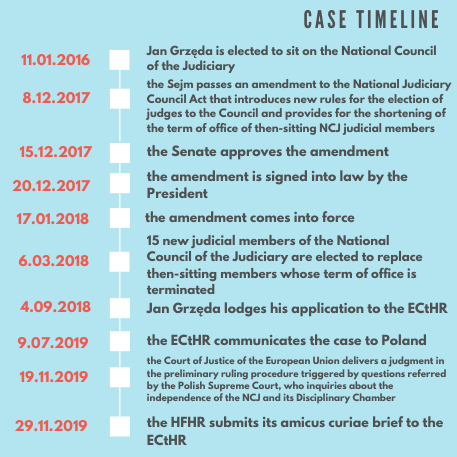
Strasbourg Court to rule on prematurely dismissed judge member of Polish Judiciary Council. HFHR submits amicus curiae brief
♦ The Helsinki Foundation for Human Rights has submitted an amicus curiae brief with the European Court of Human Rights in the case Grzęda v. Poland.
♦ The case concerns a judge elected to the National Council of the Judiciary whose term of office has been early terminated.
♦ The judge complains he could not exercise the right to a court while seeking remedy against termination. The term was cut short based on the controversial law adopted in December 2017 that introduced new rules for the election of 15 judicial members of the NCJ.
The applicant, Jan Grzęda, is a judge of the Supreme Administrative Court. In January 2016, he was elected a member of the National Council of the Judiciary. According to the Constitution, his term of office should last four years, but in December 2017, the Sejm passed a law which terminated the mandate of all 15 judges sitting on the NCJ. The legislators justified this step with the need to implement the judgment of the Constitutional Tribunal of 20 June 2017, in which the Tribunal ruled that the provisions setting out the rules of electing NCJ members appointed by the judiciary and introducing “individual” term of office for each elected member of the NCJ were unconstitutional. The new law introduced a completely different model for the election of judges to the NCJ – from that moment on, they were to be appointed not by other judges, but by the Sejm. Since the law did not provide the prematurely recalled members of the NCJ with any remedy against their dismissal, Judge Grzęda turned directly to the ECtHR, lodging the application in which he complained of a breach of Convention Article 6(1) (right to a court) and Article 13 (right to an effective remedy).
HFHR writes to Strasbourg Court
In its amicus curiae brief, the HFHR refers to three important problems in the case:
- the irrevocability of judicial members of the NCJ,
- the conformity of the shortening of the term of office without a remedy with the standards of the rule of law,
- the fact that a constitutional complaint cannot, in the current circumstances, be considered an effective domestic remedy.
The Foundation noted that neither the Constitution nor other laws applicable as of the date of the applicant’s election had allowed for the dismissal of a judge appointed to serve on the NCJ. Moreover, according to the jurisprudence of the Constitutional Tribunal, a shortening of the term of office of a constitutional body would only be allowed in exceptional cases.
The dismissal of a judge from the NCJ accompanied by a failure to provide him with a judicial remedy was incompatible with the principle of the rule of law because, alongside other changes introduced by the December 2017 law, it undermined the independence of the Council and, given the crucial powers vested in the NCJ, also affected the independence of the judiciary. In this respect, the HFHR noted, inter alia, a recent judgment of the Court of Justice of the European Union, in which the CJUE pointed to the fact that the incumbent NCJ was formed after the pre-term expiry of tenure of its former judicial members was a factor to be considered in the assessment of the Council’s independence and its impact on the independence of the judiciary. The Foundation also emphasised that the shortening of the term of NCJ members could not be justified by an effort to comply with the judgment of the Constitutional Tribunal issued in June 2017, as the Tribunal made no indication whatsoever that NCJ members elected on the basis of unconstitutional regulations must be immediately dismissed. Moreover, the HFHR noted the number of controversies raised by the judgment itself, e.g. the fact that it was delivered by a panel including two improperly appointed persons.
Finally, referring to the effectiveness of the constitutional complaint as a legal remedy, the HFHR stressed that in the current circumstances, given the widely discussed problems relating to the presence of improperly appointed persons in Tribunal’s panels, the irregularities in case assignment and a significant decrease in the number of constitutional rulings, the constitutional complaint could no longer be considered an effective mechanism. Furthermore, regardless of the above institutional problems encountered by the Polish constitutional court, the constitutional complaint would not provide any protection to the dismissed members of the NCJ, as it would not lead to their reinstatement in the Council.
Case timeline:
- 11 January 2016 – Jan Grzęda is elected to sit on the National Council of the Judiciary.
- 8 December 2017 – the Sejm passes an amendment to the National Judiciary Council Act that introduces new rules for the election of judges to the Council and provides for the shortening of the term of office of then-sitting NCJ judicial members.
- 15 December 2017 – the Senate approves the amendment.
- 20 December 2017 – the amendment is signed into law by the President.
- 17 January 2018 – the amendment comes into force.
- 6 March 2018 – 15 new judicial members of the National Council of the Judiciary are elected to replace then-sitting members whose term of office is terminated.
- 4 September 2018 – Jan Grzęda lodges his application to the ECtHR.
- 9 July 2019 – the ECtHR communicates the case to Poland.
- 19 November 2019 – the Court of Justice of the European Union delivers a judgment in the preliminary ruling procedure triggered by questions referred by the Polish Supreme Court, who inquiries about the independence of the NCJ and its Disciplinary Chamber.
- 29 November 2019 – the HFHR submits its amicus curiae brief to the ECtHR.
To download:


02.12.2019
 Cookies EN
Cookies EN